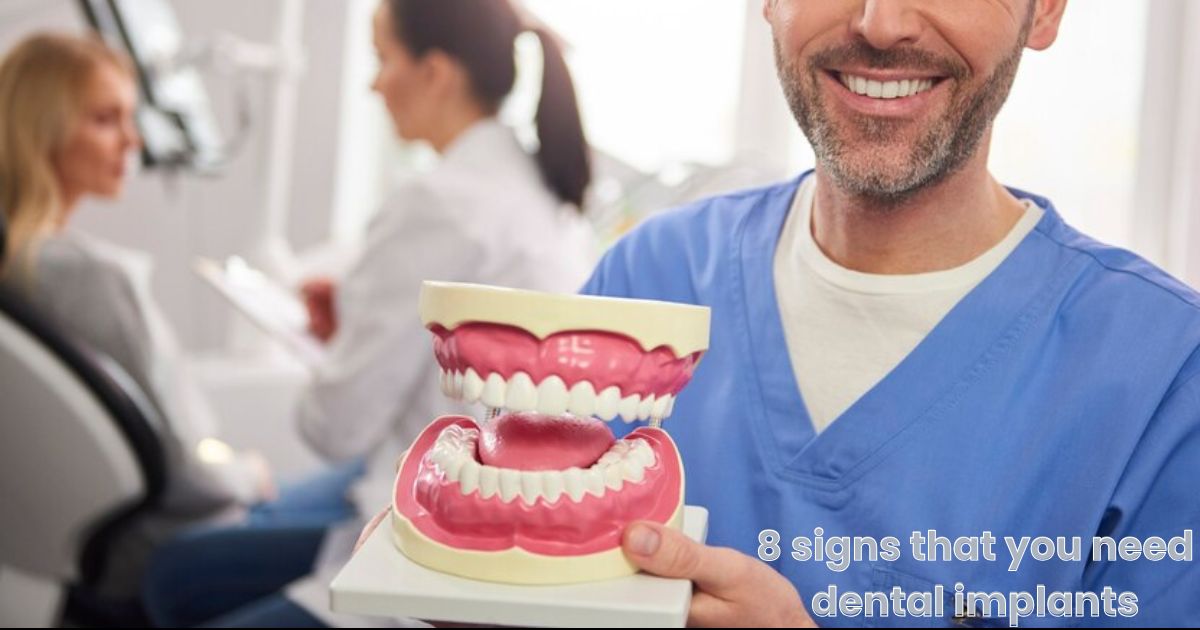Have you ever felt self-conscious about your smile or struggled with chewing because of missing teeth? 8 signs that you need dental implants might just be the game-changer you’re looking for. They’re not only a functional fix but also a confidence booster, helping you reclaim the smile you deserve. But how do you know if they’re the right option for you? Here are eight telltale signs to help you decide.
You Have Missing Teeth That Need Replacing
If you have one or more missing teeth, it’s a strong sign you should consider dental implants. Missing teeth can cause your jawbone to weaken over time and may lead to shifting of adjacent teeth. Implants provide a sturdy foundation for replacements, ensuring a natural look and feel while maintaining your oral health.
ALSO READ: Mentervise.com
Your Dentures Are Uncomfortable or Unstable
Do your dentures slip or feel uncomfortable while eating or talking? Ill-fitting dentures can be inconvenient and embarrassing. Dental implants serve as a secure anchor for dentures, providing unmatched stability and eliminating the need for messy adhesives.
You Struggle with Chewing or Speaking
Difficulty in chewing food or clearly articulating words is often caused by missing teeth or poorly fitting dental devices. Implants restore full functionality, allowing you to enjoy your favorite meals and converse without any awkwardness.
You Experience Jaw Pain or Discomfort
Jaw pain might result from an uneven bite caused by missing teeth. The imbalance forces your jaw to work harder, leading to discomfort or even chronic pain. Dental implants restore the balance, ensuring a more even bite and reducing stress on your jaw.
Your Face Appears Sunken or Prematurely Aged
Tooth loss can cause your jawbone to deteriorate, leading to a sunken facial appearance over time. This makes you look older than you actually are. Dental implants stimulate the jawbone, preventing bone loss and maintaining a youthful, natural facial structure.
You Have a Cracked or Severely Damaged Tooth
A tooth damaged beyond repair is a clear indicator for an implant. While dental crowns or fillings can save a moderately damaged tooth, severe cases often require extraction and replacement. An implant acts as a long-lasting substitute, seamlessly blending with your natural teeth.
You Want a Permanent Solution for Missing Teeth
If you’re tired of temporary fixes like bridges or partial dentures, dental implants offer a permanent and reliable solution. Unlike other options, implants are designed to last a lifetime with proper care, making them an excellent long-term investment in your oral health.
Your Oral Health Is Generally Good
Surprisingly, not everyone is a candidate for dental implants. Good oral health, including healthy gums and adequate jawbone density, is essential for successful implant placement. If you maintain proper oral hygiene and visit your dentist regularly, dental implants could be the right choice for you.
How Dental Implants Transform Lives
Dental implants don’t just replace teeth—they transform lives. From boosting confidence to improving functionality, implants address both aesthetic and practical concerns. Imagine being able to smile, eat, and talk without hesitation—it’s a freedom worth considering.
The Process of Getting Dental Implants
The procedure for dental implants typically involves several stages, starting with a consultation. Your dentist will evaluate your oral health and create a customized plan. After the implant is surgically placed, a healing period allows the jawbone to integrate with the implant. Finally, a crown is attached, completing the process and restoring your smile.
Common Misconceptions About signs that you need dental implants
Many people think dental implants are painful or too expensive. However, advancements in dental technology have made the procedure more comfortable and accessible. While the initial cost may seem high, the durability and benefits of implants outweigh the expense in the long run.
Maintaining Your Dental Implants
Caring for implants is similar to caring for natural teeth. Brushing twice daily, flossing, and regular dental check-ups ensure their longevity. With proper maintenance, implants can last a lifetime, making them a wise choice for anyone looking to enhance their oral health.
Are You a Candidate for Dental Implants?
If any of these signs resonate with you, it’s time to consult your dentist. They will assess your condition and determine if dental implants are suitable for your needs. Taking the first step could lead to a lifetime of confident smiles and improved oral functionality.
Conclusion
Dental implants are more than a cosmetic fix—they’re a transformative solution for missing teeth, offering lasting benefits for both your appearance and overall health. If you’ve noticed any of these signs, don’t hesitate to explore the possibility of dental implants. Your smile deserves the best care, and implants might just be the perfect answer.
FAQs:
How long does the dental implant procedure take?
The process can take a few months, including the healing period, but the results are worth the wait.
Are dental implants painful to get?
The procedure is performed under anesthesia, ensuring minimal discomfort during the process.
How much do dental implants cost?
The cost varies based on individual needs, but many find them to be a worthwhile long-term investment.
Can anyone get dental implants?
Candidates must have good oral health and sufficient jawbone density for successful placement.
How long do dental implants last?
With proper care, dental implants can last a lifetime, making them a durable and reliable option.









